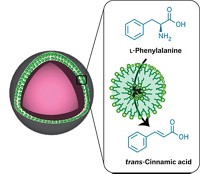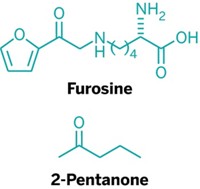Advertisement
Grab your lab coat. Let's get started
Welcome!
Welcome!
Create an account below to get 6 C&EN articles per month, receive newsletters and more - all free.
It seems this is your first time logging in online. Please enter the following information to continue.
As an ACS member you automatically get access to this site. All we need is few more details to create your reading experience.
Not you? Sign in with a different account.
Not you? Sign in with a different account.
ERROR 1
ERROR 1
ERROR 2
ERROR 2
ERROR 2
ERROR 2
ERROR 2
Password and Confirm password must match.
If you have an ACS member number, please enter it here so we can link this account to your membership. (optional)
ERROR 2
ACS values your privacy. By submitting your information, you are gaining access to C&EN and subscribing to our weekly newsletter. We use the information you provide to make your reading experience better, and we will never sell your data to third party members.
Synthesis
Engineered Lipase Cuts Out Trans Fats
Enzyme selectively hydrolyzes trans and saturated fatty acids, removing the unhealthy components from vegetable oils
by Stephen K. Ritter
December 12, 2011
| A version of this story appeared in
Volume 89, Issue 50
Biochemists led by Uwe T. Bornscheuer of Germany’s University of Greifswald have engineered the first enzyme capable of selectively hydrolyzing unhealthy fatty acids from triglycerides in partially hydrogenated vegetable oils. The development could lead to a new industrial food process. In 1901, German chemist Wilhelm Normann invented the catalytic process for hydrogenating double bonds in the fatty acid chains of vegetable oils. Modifying the oils helps prevent them from turning rancid and raises their melting points so they can be handled as solids. But there was an unforeseen catch: Trans fatty acids, a by-product of the hydrogenation process, are now known to be a risk factor for heart disease, obesity, and other health problems. Food processors have responded by chemically reformulating their products to reduce trans fat content. In a different approach, Bornscheuer’s team created a variant of a fat-cleaving lipase, originating from the yeast Candida antarctica, and expressed it in Escherichia coli using a new protein-engineering strategy combined with high-throughput enzyme screening (Angew. Chem. Int. Ed., DOI: 10.1002/anie.201106126). The variant selectively hydrolyzes trans and fully saturated fatty acid chains; the cleaved unhealthy fatty acids can be separated from the remaining mono- and diglycerides in the vegetable oil.




Join the conversation
Contact the reporter
Submit a Letter to the Editor for publication
Engage with us on Twitter